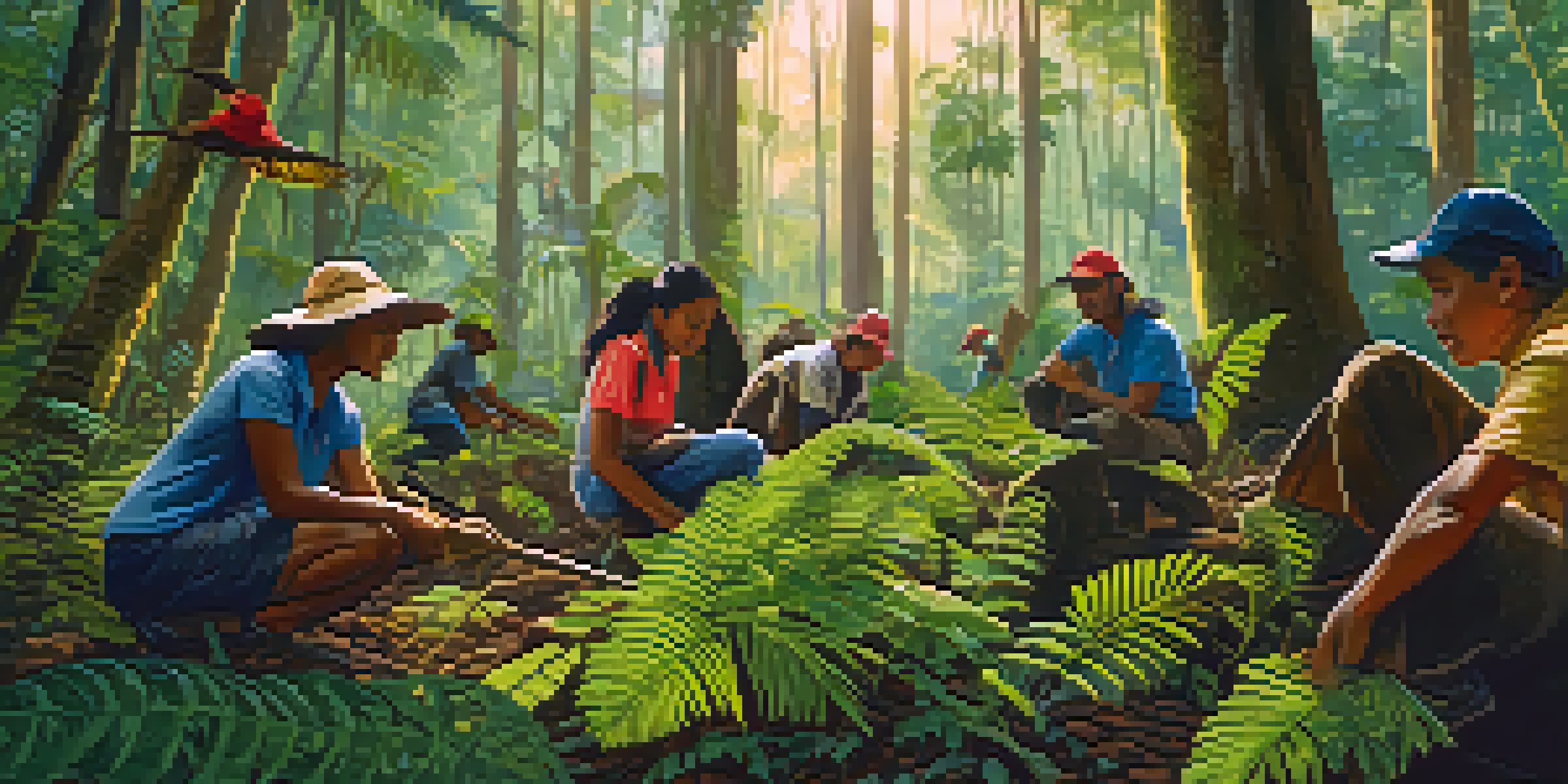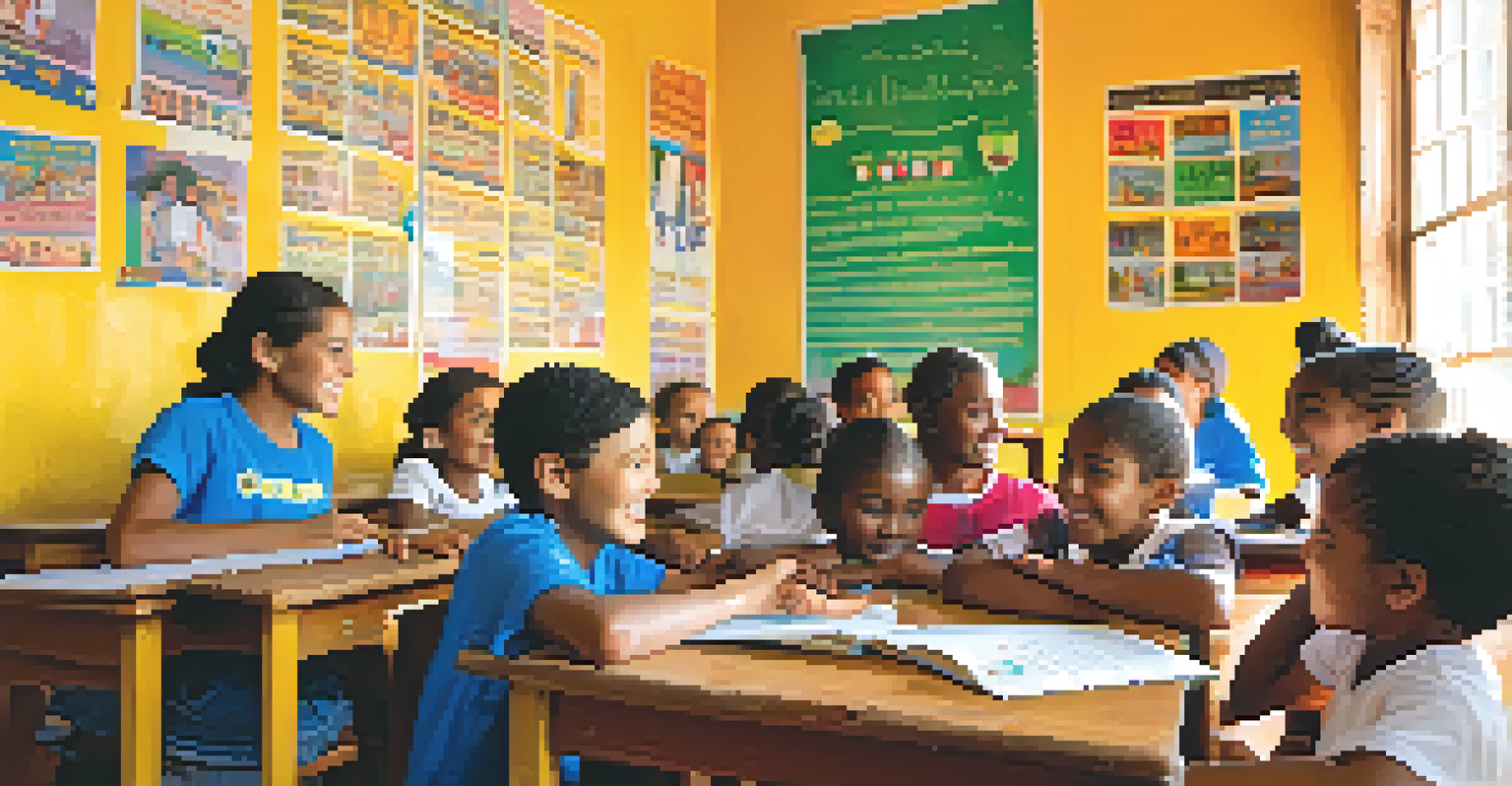The Role of Volunteer Tourism in Brazil's Sustainable Development

Understanding Volunteer Tourism and Its Impact
Volunteer tourism, or 'voluntourism,' combines travel with community service. This trend allows travelers to immerse themselves in a culture while contributing to social and environmental projects. In Brazil, this form of tourism not only enhances the travel experience but also provides crucial support to local communities.
Volunteering is at the very core of being a human. No one has made it through life without someone else’s help.
The impact of volunteer tourism is multifaceted. It helps address pressing issues like poverty, education, and environmental conservation. By engaging in hands-on projects, volunteers can see the direct effects of their contributions, creating a sense of fulfillment and connection with the local culture.
Moreover, this form of tourism encourages responsible travel practices. Volunteers often become advocates for sustainability, raising awareness of local issues and promoting eco-friendly behaviors among fellow travelers.
Brazil's Rich Biodiversity and Volunteer Opportunities
Brazil is home to some of the world's most diverse ecosystems, from the Amazon rainforest to the Pantanal wetlands. This rich biodiversity presents unique opportunities for volunteers to engage in environmental conservation efforts. Many programs focus on wildlife protection, reforestation, and habitat restoration.

For instance, volunteers might work on projects that track endangered species or help maintain natural reserves. Such experiences not only aid the environment but also allow volunteers to witness Brazil's stunning landscapes firsthand. This connection often leads to a deeper appreciation for the country's natural resources.
Voluntourism Enhances Local Communities
Volunteer tourism fosters community development by empowering locals through educational and infrastructure initiatives.
By participating in these initiatives, volunteers contribute to the preservation of Brazil's unique habitats, ensuring they remain vibrant for future generations. This symbiotic relationship between travelers and the environment highlights the importance of sustainable practices in tourism.
Community Development Through Volunteer Initiatives
Beyond environmental efforts, volunteer tourism plays a pivotal role in community development in Brazil. Many programs focus on education, health, and infrastructure improvement. Volunteers often assist in teaching English, providing healthcare, or helping to build facilities, thus directly impacting local communities.
The best way to find yourself is to lose yourself in the service of others.
This community-driven approach fosters a sense of empowerment among residents. As volunteers work alongside locals, they share skills and knowledge, promoting self-sufficiency. This collaboration often results in long-lasting benefits, as communities gain tools and resources to continue their development even after volunteers leave.
Additionally, these initiatives create a cultural exchange, enriching both the volunteers and the communities they serve. The bonds formed through shared experiences can lead to lasting friendships, further enhancing the impact of volunteer tourism.
The Economic Benefits of Volunteer Tourism
Volunteer tourism also brings economic benefits to Brazil. When volunteers travel to participate in projects, they contribute to the local economy by spending on accommodations, food, and activities. This influx of funds can support small businesses and create job opportunities for local residents.
Moreover, the presence of volunteers often attracts more tourists to the region. As word spreads about the positive impacts of volunteer programs, more travelers are likely to visit, further boosting the economy. This trend highlights how responsible tourism can lead to sustainable economic growth.
Brazil's Biodiversity Offers Unique Roles
The diverse ecosystems in Brazil provide volunteers with opportunities to engage in crucial environmental conservation efforts.
However, it's essential for volunteer programs to operate ethically, ensuring that the local community benefits from the economic activity generated. Transparency in funding and project execution can help maintain a positive relationship between volunteers and residents.
Challenges Facing Volunteer Tourism in Brazil
While volunteer tourism has many benefits, it also faces challenges in Brazil. One significant issue is the risk of 'voluntourism fatigue,' where communities become overwhelmed with transient volunteers. This can lead to burnout among locals who may feel they are constantly required to host and train new visitors.
Another challenge is ensuring that volunteer projects are genuinely beneficial and not merely superficial. It's crucial that programs engage with local communities to identify their needs and ensure that volunteers' efforts align with those priorities. Otherwise, initiatives may lack sustainability and fail to create lasting change.
Additionally, the environmental impact of increased tourism must be managed carefully. Striking a balance between welcoming volunteers and preserving natural habitats is essential for long-term sustainability.
The Role of Technology in Volunteer Tourism
Technology is transforming the landscape of volunteer tourism in Brazil. Online platforms make it easier for volunteers to find and connect with projects that align with their interests and skills. This accessibility broadens participation and encourages a diverse range of volunteers to engage in meaningful work.
Moreover, social media plays a significant role in raising awareness about volunteer opportunities. Travelers can share their experiences, inspiring others to join the movement. This visibility helps promote responsible tourism practices and highlights the positive impacts of volunteer efforts on local communities.
Economic Growth from Volunteer Programs
Volunteer tourism contributes to Brazil's economy by attracting travelers who support local businesses through their spending.
However, the reliance on technology also necessitates a critical examination of how these platforms operate. Ensuring that they prioritize ethical practices and transparent communication is vital for maintaining the integrity of volunteer tourism.
The Future of Volunteer Tourism in Brazil
Looking ahead, the future of volunteer tourism in Brazil appears promising yet requires careful navigation. As more travelers seek meaningful experiences, the demand for volunteer opportunities is likely to grow. This trend can lead to increased funding and resources for local projects, enhancing their capacity to create positive change.
However, it's essential for stakeholders to prioritize sustainability and ethical practices. Collaborating with local communities to ensure their voices are heard will be crucial in shaping programs that genuinely address their needs. This approach will help maintain the balance between tourism and community development.

Ultimately, volunteer tourism has the potential to be a powerful force for change in Brazil. By fostering connections between travelers and local communities, it can contribute to a more sustainable and equitable future.